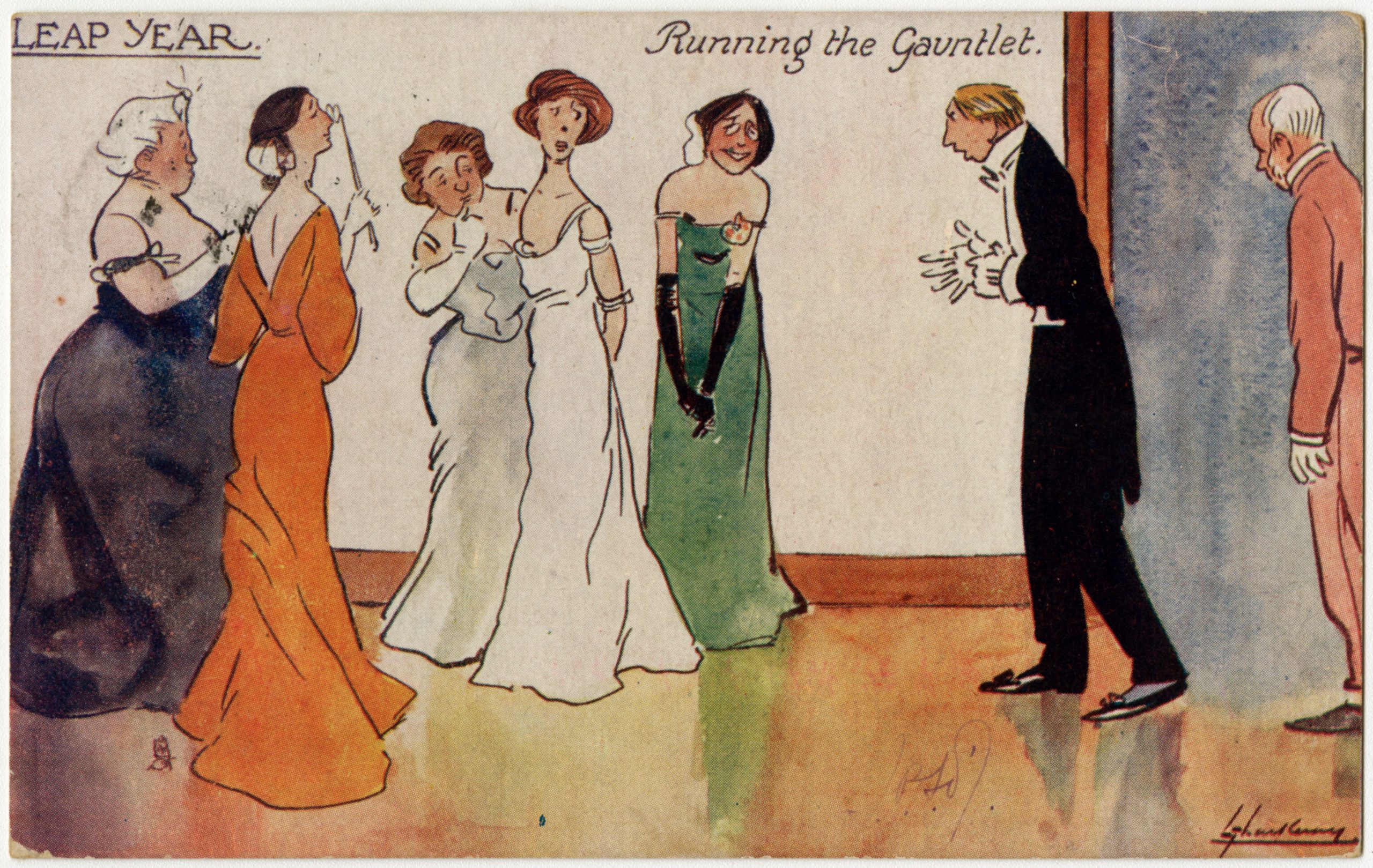Curious Questions: Why can women 'only' propose on the 29th February?
It's 2020, and women can propose whenever and wherever they want. But where did this strange tradition come from? Ladies, gather your red petticoats and Poundland rings – Victoria Marston is here to clear things up a bit.


At school, I knew a girl who was born on February 29. At the time, she was greatly pitied for not really having a birthday every three out of four years. Ultimately, I’d say, she’ll have the last laugh when she is able to claim – with a decent pinch of salt – to be celebrating her 20th birthday as we all turn 80.
As we all know, leap years, in which we bump up our standard 365-day Gregorian calendar to 366 with the addition of February 29, arrive once every four years. This is to accommodate the fact that the Earth actually takes 365.2422 days to orbit the Sun. If we didn’t, at some point in the future (about 750 years, to be precise), we would find ourselves enjoying winter in June.

The arrival of a leap year is marked in various ways around the world, not only by those celebrating their rare, yet true birthdays – ‘leaplings’, if you will. In Ireland, Leap Day is also known as Bachelor’s Day, thanks to the tradition whereby women are ‘allowed’ (perhaps ‘encouraged’ might be more appropriate these days) to propose to the man in their life. This supposedly stems from a complaint made by nun St Brigid of Kildare, in the 5th century, that women were having to wait too long for their prospective husbands to get down on one knee.
Queen Victoria proposed to Prince Albert on October 15, 1839. This was nothing to do with leap years, but was because no one was allowed to propose marriage to the reigning monarch
In response, St Patrick agreed that long-suffering ladies could take the initiative on this day, once every four years, ‘balancing’ the powers between the sexes in the same way the additional day balanced the calendar… depending on your definition of balance, of course. For any gentleman who declined such an offer, there was a penalty to pay – a new dress, material for a new skirt, money, a fur coat or 12 pairs of gloves, depending on which account you read. The logic behind the gloves was that the woman would be able to hide her ringless finger (and shame) from prying eyes.

The 1606 book Courtship, Love, and Matrimonie took things a step or two further, asserting that not only did women have the right to take the lead in romantic matters for the duration of a leap year (as opposed to only on the one day), they actually gained this power at the expense of a man’s prerogative: ‘Albeit, it is nowe become a parte of the Commun Lawe, in regard to the social relations of life, that as often as every besextile year doth return, the ladyes have the sole privilege, during the time it continueth, of making love unto the men, which they may doe either by wordes or lookes, as unto them it seemeth proper.’
The Guinness World Record for ‘most siblings born on Leap Day’ is held by the Henriksen family in Norway, with Heidi (1960), Olav (1964) and Leif-Martin (1968) all sharing their infrequent birthdays
All this may sound somewhat archaic, but someone at Poundland obviously thinks there’s something in it – the high-street retailer is currently selling a £1 engagement ring called the Ask Him Ring (‘Because he might never get round to it’). Poundland fan or no, this does seem an economical solution for any ladies who suspect they may soon be in possession of 12 pairs of gloves. If you’re in Scotland, you might also want to scan the aisles for a bargain red petticoat – legend has it you’re supposed to wear one for the occasion, presumably to give the beleagured male ample warning and a chance to flee.

Any women in pursuit of a husband this month might well be hoping for a healthy dose of luck – although, according to Courtship, Love, and Matrimonie, men are actually forbidden from saying no – and luck comes into the equation both at home and abroad. Women in Finland are similarly encouraged to propose marriage on leap-year day, but, in Greece, taking your vows on this day is considered highly unlucky and likely to end in divorce. In both Scotland and India, being born on February 29 condemns you to a lifetime of misfortune (sorry, leaplings). The Germans have a jollier take on things. In the Schaltjahr, it is traditional for only women to dance around the maypole come May Day – perhaps to show themselves off to best advantage before all the proposing starts.
Exquisite houses, the beauty of Nature, and how to get the most from your life, straight to your inbox.
The Salem Witch Trials began on February 29, 1692, when a slave, a beggar and an elderly woman were accused of witchcraft by a group of young girls
In an age when women can actually propose to whomever they choose, on any day they fancy, we may finally appreciate just how nerve-racking it has been for men all this time. Perhaps these words, from The Parterre of Poetry and Historical Romance (1836), might lend some courage on Saturday: ‘Come out, pretty tremblers, let us hear what you have to say? Never blush and never shrink! We are no Neros. Your cases shall be considered. We will look into your administration during the last three years. You must be patient, and hope for the best, mes chères.’ Well… equality in all things, I suppose.

Credit: Daniel Gould / Country Life Picture Library
Britain's Naughtiest Dog 2019: All the winners, from the Jack Russell who summoned the armed police to the pointer who vomits glitter
Sociable, sun-loving and incredibly patient with children, this innocent-looking Jack Russell actually enjoys a secret life of crime. Victoria Marston

Skiing in Colorado: Spectacular powder, free pancakes and that incredible feeling of having a mountain to yourself
Skiing in the Alps is great, of course – but a winter trip to the Rockies is a completely different experience,

The wheelwrights who’ve been in the business for 700 years – and who work for The Queen
Mike and Greg Rowland hold a royal warrant from The Queen to keep her carriages in trim – and it's
